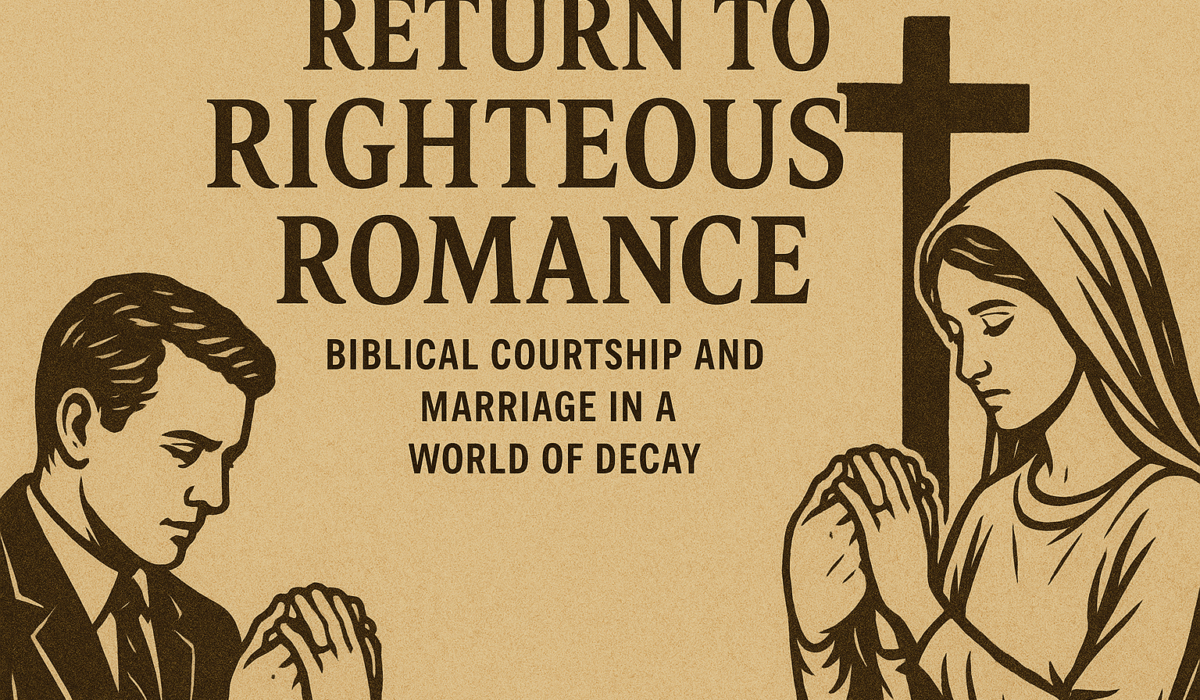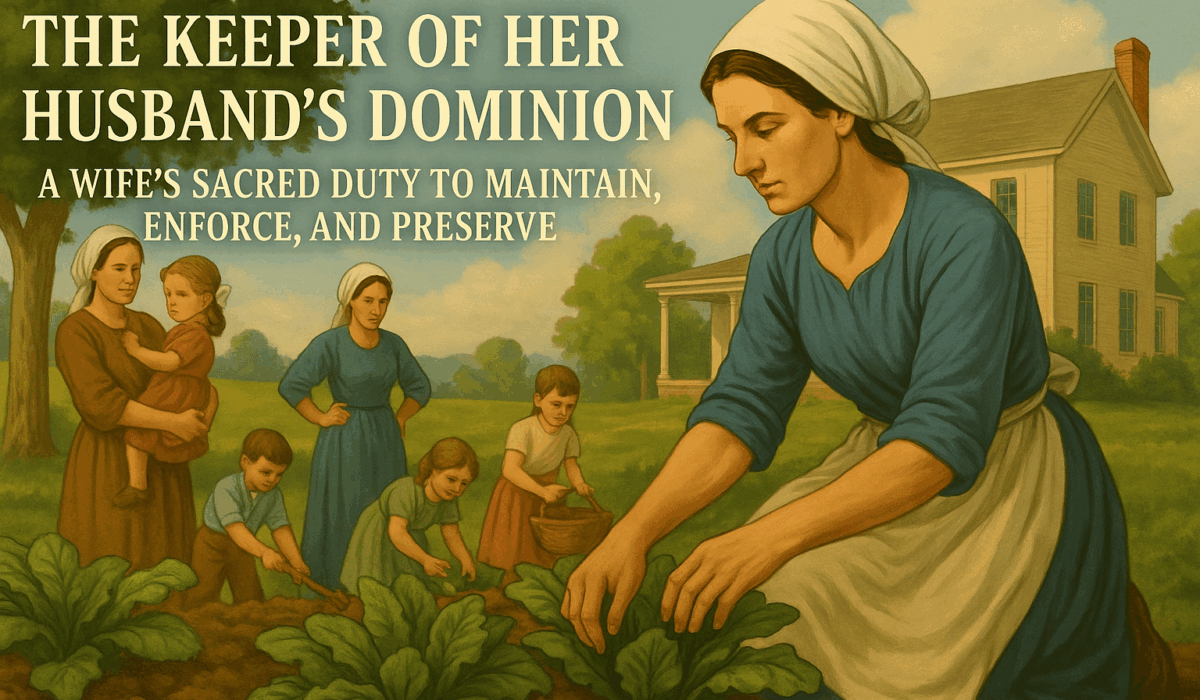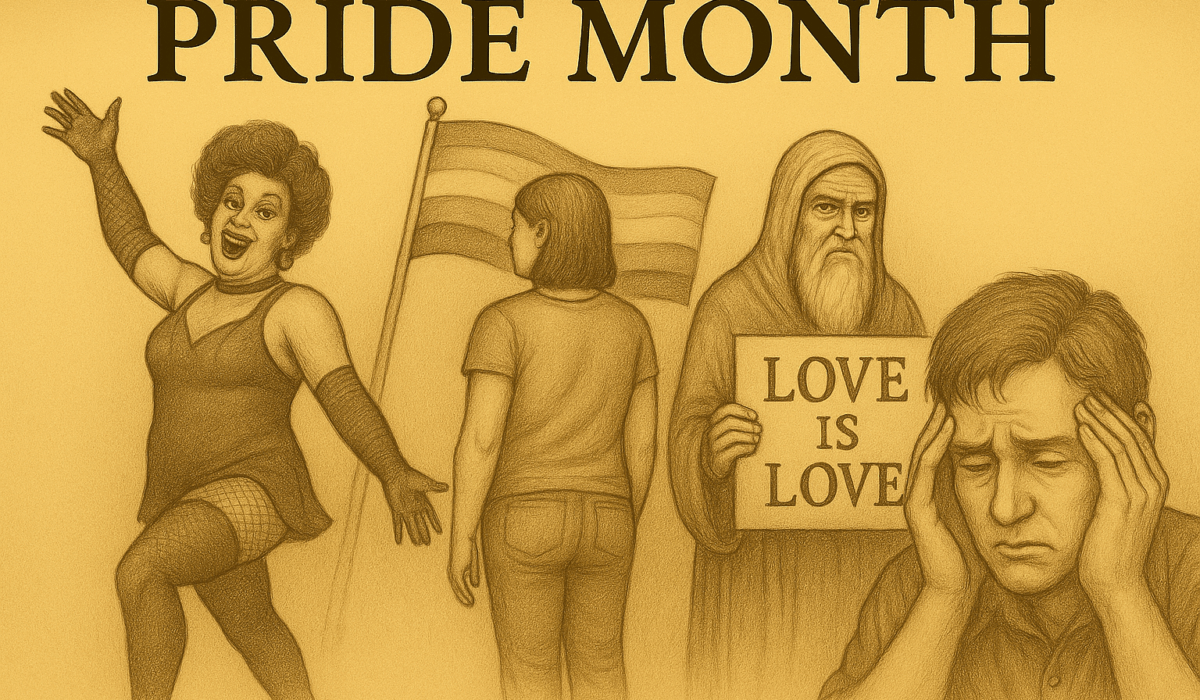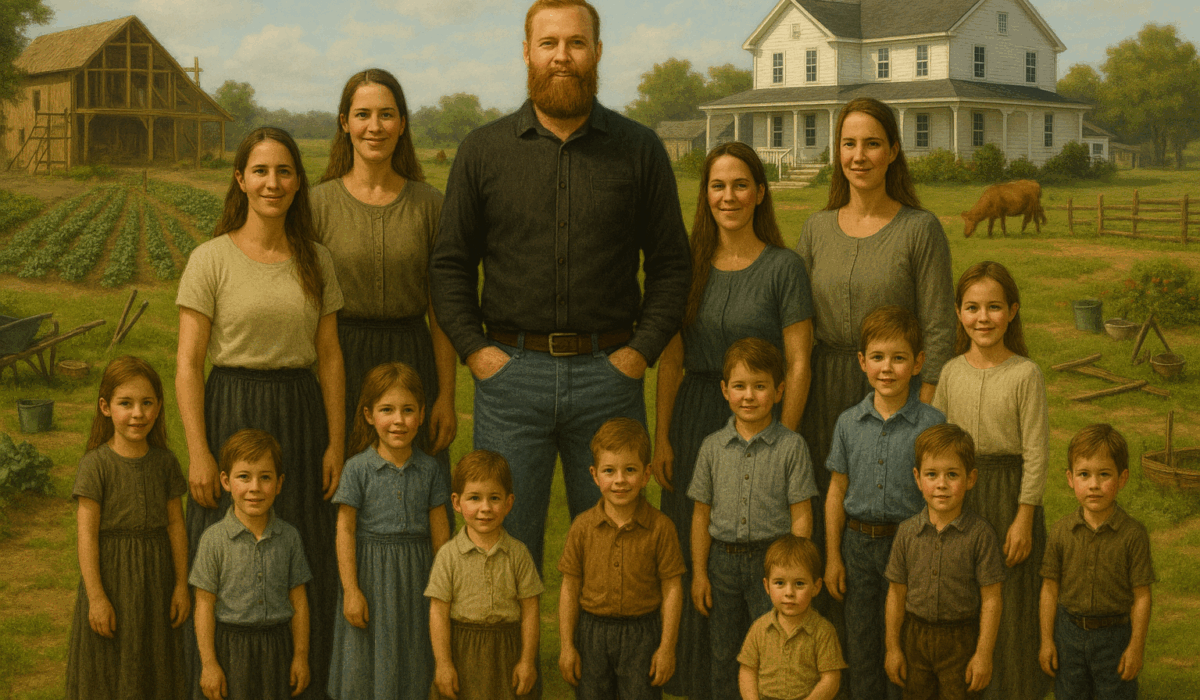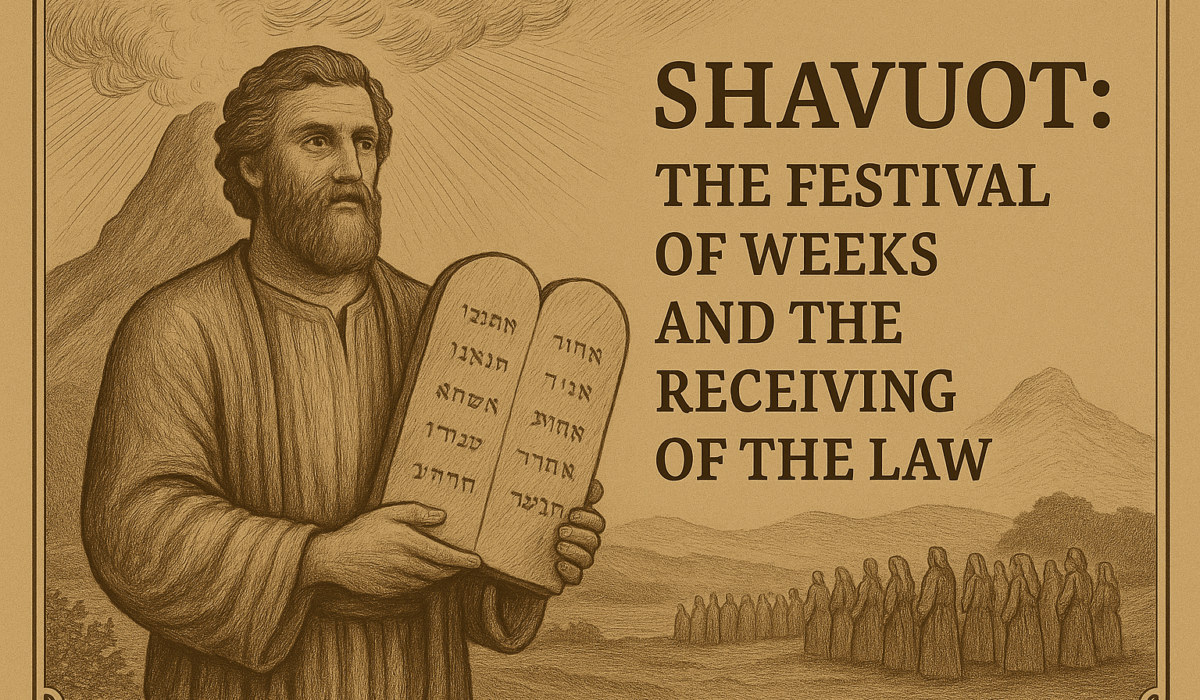Marriage is not a private romance. It is a public covenant. It is not a casual connection—it is kingdom architecture. And courtship is not flirting for Christians. It is preparation for a holy war: the formation of households, the raising of godly seed, the extending of dominion. In the world of The Great Order, marriage is no accident, and courtship is no playground. It is sacred, ordered, and guarded by the Word of God.
We do not let our sons and daughters wander into love like blind sheep. We shepherd them toward it. We measure the man. We test the woman. We consult the fathers. We count the cost. We uphold honor. And we build strong, patriarchal, multi-generational households.
Let the feminized culture mock. Let the degenerates rage. Let the compromised churches weep for their lost daughters. We will return to the ancient paths—and in doing so, we will restore what modernity has destroyed.
I. Courtship is Covenant Preparation
Biblical courtship is not dating. It is not recreational. It is not casual. It is not about finding “compatibility.” It is the process of preparing to build a household under God’s law and order.
From Genesis to Revelation, marriage is never entered lightly. It is a covenant with legal, spiritual, economic, and generational weight. Courtship, therefore, is the guarded path to that covenant.
The Biblical framework assumes:
Male initiative
Parental involvement
Sexual purity
Chaperoned meetings
Clarity of purpose
Community witness
Obedience to divine roles
In contrast, the modern world teaches young people to “explore,” to “follow their heart,” to “date around,” and to “see what feels right.” This pagan approach has produced chaos: broken hearts, fornication, fatherless children, delayed marriage, rising divorce rates, and a generation of emotionally scarred men and women.
We must declare war on modern dating. And we must restore Biblical courtship.
II. The Biblical Foundation
God did not leave us in the dark. The Scripture gives us consistent patterns for how marriage is to begin and how courtship is to proceed.
Initiated by men: In Genesis 2:24, it is the man who leaves and cleaves. The initiative belongs to him.
Guarded by fathers: Exodus 22:16–17 and Numbers 30 make it clear that a father holds authority over his daughter’s vow and her hand in marriage.
Purity required: Hebrews 13:4 says, “Marriage is honourable in all, and the bed undefiled: but whoremongers and adulterers God will judge.”
Witnessed by community: Ruth and Boaz, for example, conduct their arrangement before elders at the gate (Ruth 4).
Confirmed with bride-price/dowry: Genesis 24, 29, and 34 all include gifts, dowries, or bride-prices exchanged as honor to the family.
Headship Is Required
A woman is not free to offer herself. 1 Corinthians 11:3 says, “the head of the woman is the man.” This means no Biblical courtship can occur without the approval of her head—whether her father, or in more complicated situations, her current male headship.
This is not control—it is covenantal covering. The woman is not her own. She was not created to lead in relationships. She is to be sought, protected, and given.
III. The Decline of Courtship: A Cultural Autopsy
For the first 10,000 +/- years of human history, courtship was patriarchal. Marriages were arranged or overseen by fathers. Courtship was a process of approval, negotiation, and preparation. It was communal, not individualistic.
But in the last century—especially post-1950—Western culture abandoned all of this. The sexual revolution, feminist movement, and rise of public schooling disconnected sons and daughters from Biblical oversight.
The results as of 2025?
Over 70% of Americans engage in premarital sex (CDC, 2022)
Over 40% of children are born out of wedlock
Average age of first marriage now exceeds 30 for men and 28 for women
Divorce rate now exceeds 60%
Over 60% of Christian youth report that their parents gave no guidance on how to pursue marriage
This is a total breakdown. The family is collapsing, not just from government interference or feminism, but because fathers stopped governing the courtship of their children.
IV. Sex Before Marriage: National Suicide
Fornication is no minor issue. Scripture warns us:
“Flee fornication” — 1 Corinthians 6:18
“Fornicators shall not inherit the kingdom of God” — 1 Corinthians 6:9
“It is God’s will that you should avoid sexual immorality” — 1 Thessalonians 4:3
The damage of premarital sex is not merely spiritual. It is also psychological, biological, and societal. Studies show:
Women with multiple sexual partners prior to marriage are far more likely to divorce (Heritage Foundation, 2016)
Premarital sex is correlated with decreased marital satisfaction (Journal of Family Psychology, 2010)
Sexual activity before marriage is associated with higher rates of depression, anxiety, and suicidal ideation in both sexes.
In the perfect Biblical model, courtship is chaste. A man may not touch a woman sexually until she is his wife. The woman of course being a virgin, still belonging to her fathers household. Anything else is theft. No hand-holding. No kissing. No private texting. No emotional dependency. Purity is protected by headship and enforced by discipline.
V. Chaperoning and Community Oversight
Courtship is not done in secret. It is public, guarded, and accountable.
Chaperoning was once standard across all Christian cultures. A young woman was not left alone with a man, lest temptation arise. This was not because women are weak—but because purity is sacred.
Proverbs 6:27 asks, “Can a man take fire in his bosom, and his clothes not be burned?” Guardrails are wisdom. Isolation is foolishness.
In a righteous courtship a father or brother is present in most interactions, all conversations are transparent for parental review, the patriarch sets boundaries and the church elders are consulted.
Modern courtship often bypasses this, and ends in ruin. Hidden sins. Secret affairs. Elopements. Or worse, fornication followed by an unequally yoked marriage.
If we want blessed unions, we must return to the blessing of oversight.
VI. Picking a Mate: Principles for Choosing a Wife
The world teaches men to chase beauty, compatibility, or career status. God teaches something else.
The Biblical man looks for:
Faith and fruitfulness: Is she submitted to Christ, to her father, and to the Scriptures?
Submission and meekness: 1 Peter 3 praises the “meek and quiet spirit.”
Feminine virtue: Titus 2:5 commands young women to be discreet, chaste, keepers at home.
Teachability: Is she moldable, willing to be discipled, eager to serve?
Love of children and home: 1 Timothy 5:14 says women should “marry, bear children, guide the house.”
Looks fade. Charm deceives. But a woman who fears the Lord shall be praised (Proverbs 31:30). Choose with generational vision, not carnal appetite.
VII. Courting Women Without Headship in a Fallen World
In an ideal world, every woman would be under her father’s rule until marriage. But we do not live in ideal times. Many women today are fatherless, orphaned, abandoned, or rebellious.
What then?
A patriarch may court such a woman under the following conditions:
She must submit to his headship early in courtship, well before marriage. If she resists male authority, she is not ready.
She must leave her former life. If she clings to old social ties, friends, and feminism, she will bring poison into the home.
She must be discipled. A period of instruction in the faith, household roles, and feminine conduct will likely be necessary.
The man must be mature and spiritually grounded. Do not try to “rescue” a woman unless you have the strength and wisdom to do so without being compromised. Courtship in a fallen world demands discernment. Many women are broken, and desperately in need of restoration, but they must come under order. The household is not a rehab center for unrepentant rebellious whores. It is a dominion outpost.
VIII. Courtship in Polygynous Marriage
Christian polygyny is not indulgence, it is dominion. And courtship for additional wives must follow the same righteous order. The existing wife or wives should be involved, not to “approve” as gatekeepers, but to provide counsel and prepare for household integration.
Biblical polygyny demands:
A stable, patriarchal household
Proven ability to lead, provide, and disciple
Righteous intentions, not lustful ambition
A godly, feminine woman who understands covenant
Courtship of a second, third or additional wife should be open, deliberate, and above reproach. The existing family is expanded—not destroyed.
IX. Age for Courting
Biblically, there is no magic number. But Scripture assumes that marriage follows puberty, economic readiness, and covenantal maturity.
Girls in Biblical times often married in their mid-teens. Boys, slightly older. The pattern was:
Young women: Ready to bear children and guide a home
Young men: Ready to provide, lead, and establish a house
Modern delays in marriage are often sinful, due to extended adolescence, careerism, or lack of responsibility. As soon as a young man can provide, and a young woman is under godly headship, courtship may begin.
X. Rules of Courtship
A righteous courtship is governed by the following non-negotiables:
1. Parental or headship oversight at all times
2. No physical contact or private communication
3. No courtship without stated intention to marry
4. Chaperoned meetings, or meetings in the home
5. Accountability to a godly community
6. Regular instruction in roles, theology, and household function
7. Clear timelines—no indefinite engagements
Courtship is not endless dating. It is purposeful, pure, pointed, and for the purpose of marriage.
XI. Minimum Requirements for a Man Before Courtship
A man may not court a woman unless he is ready to be her head. This means:
Spiritual maturity: He must walk in submission to Christ.
Financial provision: He must be able to feed, clothe, and house his wife.
Doctrinal clarity: He must know and teach the Scriptures.
Emotional stability: He must not be ruled by lust, fear, or selfishness.
Household vision: He must have a plan for children, economy, and dominion.
No man should court out of loneliness, lust, or boredom. Courtship is the doorway to kingdom rule. Only men of God may pass through.
XII. Dowry, Bride Price, and the Economics of Covenant Honor
Modern weddings have become a hollow pageant. Expensive dresses, choreographed dances, Instagram posts—and no substance. What once was a covenantal transition of households, guided by honor, provision, and family order, is now often reduced to emotional indulgence and consumerist display.
But the Biblical pattern is not concerned with sentiment or spectacle. It is concerned with covenant. And every covenant requires a price, a sign, and a witness. In the case of marriage, this includes two ancient institutions almost forgotten in the West: bride price and dowry.
These are not cultural relics. They are covenantal principles—rooted in Scripture, rich with meaning, and absolutely essential to restoring marriage as a serious and sacred institution.
A. Bride Price: A Gift of Honor and Proof of Capacity
In the Biblical model, when a man desires to take a woman as his wife, he does not merely speak to her. He must go through her father. And he must do more than ask—he must give.
This giving is called the bride price, or mohar in Hebrew. It is not a transaction. It is not a purchase. It is a public demonstration of honor and readiness. The bride price honors the father’s authority, compensates for the economic loss of the daughter, and signals the suitor’s ability to provide for a household.
Biblical Examples:
- Genesis 24:53 – Abraham’s servant, when securing Rebekah as a wife for Isaac, gave jewels of silver, jewels of gold, and raiment to Rebekah and gave precious things to her brother and her mother. This was not bribery. It was a declaration of honor, wealth, and serious intent.
- Genesis 29 – Jacob, without wealth to offer, labored seven years for Laban in order to marry Rachel. This was his bride price. He exchanged labor in place of silver. This shows the principle: if you cannot pay in wealth, you must pay in work.
- Genesis 34:12 – When Shechem sought to marry Dinah (after defiling her), he said: “Ask me never so much dowry and gift, and I will give according as ye shall say unto me.” Even in his shame, Shechem understood that the father’s honor must be restored and a price must be offered.
Purpose of the Bride Price:
- Affirms the authority of the father – A man must not bypass the father. He must acknowledge his headship by giving him honor.
- Proves the man’s ability to provide – If he cannot give a gift now, how will he feed his wife later? The bride price is an economic litmus test.
- Initiates the covenant transaction – Just as Christ purchased His bride with His blood, the man offers a price to begin the covenant bond.
- Compensates the family – A daughter’s departure is not just emotional, it is economic. She labors in the home, helps siblings, and contributes to the household. The bride price acknowledges that.
B. Dowry: The Wife’s Inheritance and Security
The dowry is the portion of wealth or goods given to the bride herself—either from her father’s household or from the husband—as part of her covenantal transition into marriage. In many Biblical cases, the dowry formed her initial economic foundation within the new home and served as a kind of security or inheritance.
The dowry is distinct from the bride price, though in some Scriptures the two are used interchangeably depending on the context or translation. The dowry is given to the bride, not her father.
Scriptural Insights:
- Exodus 22:16–17 – If a man seduces a virgin, he must “endow her to be his wife.” This indicates that he must provide for her materially—he cannot simply take her and leave her uncovered.
- 2 Samuel 3:14 – David demands the return of Michal, Saul’s daughter, for whom he paid a bride price of “a hundred foreskins of the Philistines.” This shows that the bride price was serious, costly, and covenantal.
- Job 42:15 – Job gave his daughters an inheritance among their brethren, an example of dowry-like provision for a daughter’s future.
- Proverbs 31:21–22 speaks of the virtuous wife’s possession of fine clothing, coverings of tapestry, and scarlet apparel. This presumes a household economy that can provide and a woman who is equipped, not just with virtue, but with tangible goods for her stewardship.
Purpose of the Dowry:
- Launches the economic life of the wife – The dowry gives the new bride a foundation of wealth she may steward within the home.
- Demonstrates her father’s love and investment – A wise father equips his daughter not with vanity, but with real assets to help build her new household.
- Guards her in case of widowhood or abuse – In some historical contexts, the dowry could return to the wife if her husband died or unjustly divorced her, serving as a financial safeguard.
- Elevates her standing in the home – A woman who enters marriage with a dowry is not a beggar or a dependent. She is a contributor and steward from day one.
- Modern Adaptation – A woman who enters marriage where pre-existing debt is assumed by the husband is a form of dowry.
C. The Bride Price and Dowry in Harmonious Union
In some marriages, both bride price and dowry are given. This is ideal: the bride price flows from the suitor to the father, and the dowry flows from the father to the daughter.
In such cases, the result is:
- A father honored
- A woman equipped
- A husband tested
- A covenant initiated with gravity, not flippancy
This dual provision reinforces the weight of marriage. It is not about feelings. It is about foundations.
D. Why These Practices Still Matter Today
The modern West scoffs at dowries and bride prices. They are seen as barbaric, patriarchal, or sexist. But they are none of these things. They are Biblical. And they are needed more now than ever.
1. They Reinforce Male Responsibility
In a time when men marry with no job, no plan, and no vision, the bride price demands proof. It says: If you want a woman, you must be a man first. No more couch-surfing husbands. No more “partnerships” of mutual poverty. The bride price filters out the weak.
2. They Restore Fatherly Authority
In an age when daughters rebel and fathers are sidelined, these practices restore the proper chain of command. A man must speak to her head. He cannot bypass the structure God has put in place. If the father is godly, his blessing matters. If he is dead, that responsibility may fall to an elder, guardian, or husband in a polygynous setting—but there must be covering.
3. They Anchor Marriage in Economic Reality
Love does not pay bills. Romance does not build houses. Chores, discipline, and provision do. Dowries and bride prices bring marriage back to earth. They tie emotion to economy. They signal that this union is not fantasy—it is stewardship.
4. They Honor the Woman Without Idolizing Her
Feminism either degrades or idolizes women. The Biblical model does neither. It honors the woman through dowry and provision. But it also demands that she be under headship and obedient to the order of the house. A woman receives, but only within covenant.
5. They Enable Stronger, Lasting Marriages
Marriages that begin with seriousness tend to last. Studies even show that arranged marriages, which often involve family-negotiated dowries or bride prices, have significantly lower divorce rates worldwide. Not because love is forced, but because covenant is honored.
E. Common Objections Answered
“Isn’t this just buying a wife?”
No. The woman is not a commodity. The price is not for her. It is for the covenant and the household she enters. And the price is not paid to her as property, but to her father (or household head) in honor, and to her (in dowry) for provision.
“We don’t do this anymore in the West—why should we?”
Because the West is collapsing. Rebellion against God’s order has led to disaster. Every ancient culture practiced some form of dowry and bride price—and they built generational households. Our culture has abandoned both—and has produced divorce, infertility, fatherlessness, and economic ruin. The fruit speaks.
“What if the man is poor?”
Then he must wait. Or he must offer labor, like Jacob. If a man cannot give now, he is not ready to receive a wife. Poverty is not sin. But rushing into marriage without capacity is foolishness.
“What if the father refuses to accept a bride price or give a dowry?”
Then he has failed his daughter. A righteous man will want his daughter honored. If a father is wicked or absent, then a godly head (elder, mentor, or existing husband in a polygynous home) should step in. But the principle must remain: a woman is not free to offer herself. A man must prove his worth to her head.
F. Conclusion: Let the Honor Be Restored
Bride price and dowry are not optional traditions. They are the scaffolding of marriage. They separate boys from men, consumers from providers, rebels from patriarchs. They honor the house, the father, the bride, and the covenant.
Let the feminists rage. Let the worldly mock. Let the effeminate churches cringe. As for us—we will return to the ancient ways.
Let every man who desires a wife first gather his strength. Let every father who loves his daughter require her honor. Let every woman prepare to be adorned with virtue and provision. And let every marriage be built, not on emotional whim, but covenantal wisdom.
XIII. Courting Multiple Women Simultaneously
In a polygynous vision, a man may pursue multiple courtships—but not chaotically. The same rules apply:
Each woman must be courted with clarity and honor
No overlapping emotional intimacy
Each courtship is public and known to all parties
Each woman must be prepared for polygynous life
Simultaneous courtship is not an excuse for indecision. It is a means of expansion—but must be governed by the fear of the Lord.
XIV. Conclusion: Build the House or Burn the Nation
Biblical courtship is not optional. It is the only hope for rebuilding the Christian household. If we do not reclaim this process, we will lose our sons, our daughters, our future.
Courtship is not about flowers and feelings. It is about building the dominion of Christ one household at a time.
Let the father guard the gate. Let the man count the cost. Let the woman submit with joy. Let the household prepare the feast.
And let the nation watch as righteousness returns.
Let the Great Order rise!
Soli Deo Gloria.
